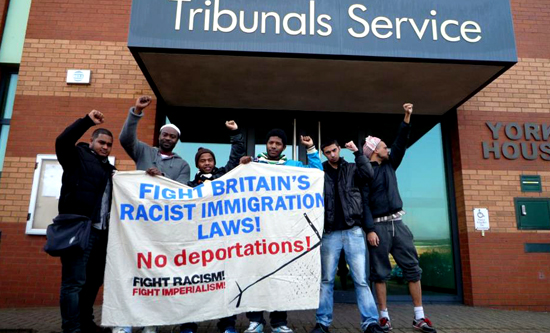Fight Racism! Fight Imperialism! 240 August/September 2014
Since passing the Immigration Act in May, state attacks on migrants have suffered a number of significant setbacks. Although limited, they demonstrate that resistance is possible.
In June the Home Office launched Operation Centurion, a high-profile campaign of immigration raids on businesses and homes. Documents leaked to the Anti-Raids Network exposed Home Office claims that the operation was ‘intelligence-led’ as nothing more than racial profiling: targets included ‘Vietnamese nail bars in the Manchester area’, Nigerian security guards in Sussex, and phone stalls in the North of Ireland. Networks of activists across Britain and the North of Ireland mobilised to warn as many as possible of those being targeted, and to inform people of their rights. Reports suggest the operation resulted in only 20 arrests, and the Home Office was unable to claim it as a victory.
On 7 July, a parliamentary inquiry was launched into immigration detention. This inquiry is significant in that it has a remit to consider the practice of detention as a whole, rather than isolated aspects, and in that it will hear directly from detainees and those organising resistance. Two days later the High Court ruled that the way the Detained Fast Track system currently operates is unlawful – asylum seekers are detained throughout their application, held on average for a week before being allowed to see a lawyer, and given a matter of hours to prepare their case. These developments follow the exposures of sexual abuse of inmates by guards at Yarl’s Wood and ongoing deaths in detention, such as that of Bruno Dos Santos, found dead in his cell in June at HMP The Verne in Portland, Dorset.
At the end of June an inquest into another death in detention, that of Brian Dalrymple in Colnbrook in 2011, concluded that neglect by staff had contributed to his death. Resistance inside Britain’s detention centres has been continuous, taking the form of protests, hungerstrikes and break-outs; these have been joined by a growing number of demonstrations outside, most recently a series of ‘Surround Harmondsworth’ protests called by Movement for Justice and supported by a number of other organisations.
On 15 July the High Court ruled against the government’s attempt to introduce a residence test for legal aid in the majority of civil cases, which would have restricted access for migrants to those who could prove they had been continuously legally resident in Britain for 12 months. The court ruled that the government’s attempt to introduce this through regulations was unlawful because it contradicted primary legislation, in this case the Legal Aid Sentencing and Punishment of Offenders Act 2012. The government intends to appeal against the judgment, but in the meantime it will not introduce the residence test as it had planned to do on 4 August.
These are victories that should be celebrated, but growing mobilisations on the streets will be needed if the gains of the inquiries and court rulings are to be maintained and built on.
Build the resistance to Britain’s racist immigration controls!
Tom Vickers




